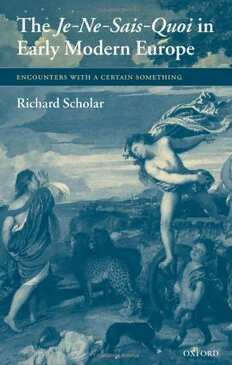
The Je-Ne-Sais-Quoi in Early Modern Europe: Encounters with a Certain Something PDF
349 Pages·2005·2.05 MB·English
Most books are stored in the elastic cloud where traffic is expensive. For this reason, we have a limit on daily download.
Preview The Je-Ne-Sais-Quoi in Early Modern Europe: Encounters with a Certain Something
Description:
What is the je-ne-sais-quoi, if it is indeed something at all, and how can it be put into words? In addressing these questions, Richard Scholar offers the first full-length study of the je-ne-sais-quoi and its fortunes in early modern Europe. He examines the expression's rise and fall as a noun and as a topic of philosophical and literary debate, its cluster of meanings, and the scattered traces of its "pre-history." Placing major writers of the period such as Montaigne, Shakespeare, Descartes, Corneille, and Pascal alongside some of their lesser-known contemporaries, Scholar argues that the je-ne-sais-quoi serves above all to trace a series of first-person encounters with a certain something as difficult to explain as its effects are intense, and which can be expressed only by being expressed differently. He shows how the je-ne-sais-quoi comes to express that certain something in the early modern period, and suggests that it remains capable of doing so today.
See more
The list of books you might like
Most books are stored in the elastic cloud where traffic is expensive. For this reason, we have a limit on daily download.
